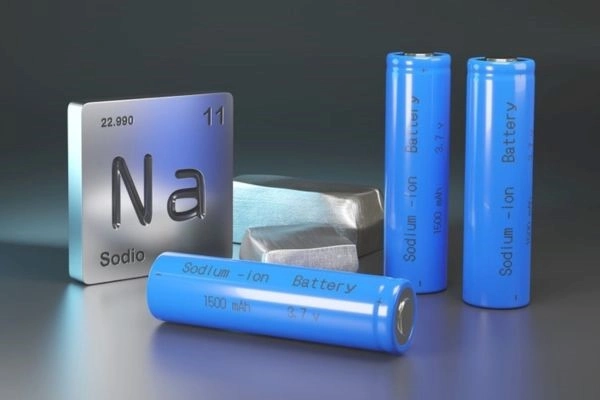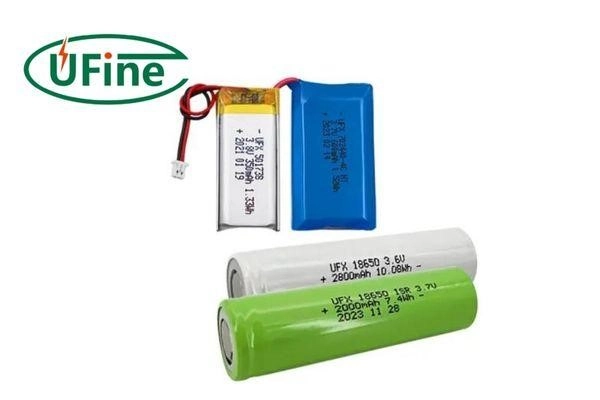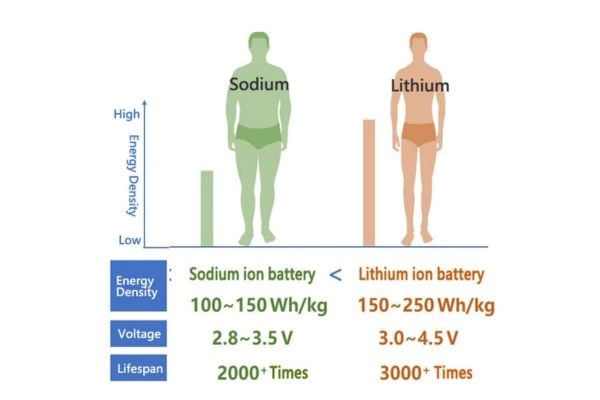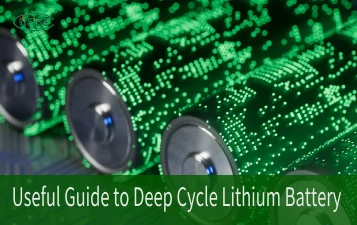When choosing the best type of battery for your electronic appliances, the debate between sodium-ion and lithium-ion batteries is common. Both sodium (Na-ion) and lithium (Li-ion) batteries are rechargeable. Still, the materials used in the batteries are very different. Both of these batteries have advantages and disadvantages. This article lets us know which battery performs better on what terms.
Part 1. Sodium Battery and Lithium Battery
Diving into the world of batteries, we compare two promising contenders: lithium vs sodium batteries. Both have sparked interest in their unique qualities, sparking a lively debate among tech enthusiasts and environmental advocates. Let’s take a closer look to understand what sets them apart.
Part 2. What are Sodium-ion Batteries?

Before going into a detailed comparison of sodium-ion batteries vs lithium-ion batteries, we should know what sodium-ion batteries are. The sodium-ion battery (NIB or SIB) is a recharged battery using sodium ions as charge carriers. It comprises a sodium-containing cathode, an anode, and a liquid electrolyte. During charging, sodium ions are extracted and inserted into the anode, while discharging occurs reversely.
There are various types of Sodium-ion batteries, including NaMnO2, Na3V2(PO4)2F3, Na2FeFe(CN)6, and Alarch. NaMnO2 batteries have a working voltage of 3.2V, a temperature range of -40℃~80℃, and a cycle life of 4500 cycles. Na3V2(PO4)2F3 batteries have an 18650 cell and demonstrate 75 Wh/kg and 4000 cycles at the 1C rate. Na2FeFe(CN)6 batteries are ideal for performance-positive electrodes and can be paired against anode materials.
Part 3. What is Lithium-ion Batteries?

Let’s take a look at Lithium-ion batteries. They are old and came into modern shape through different phases over many years. The first lithium-ion battery was developed in the 1970s, and with time, it developed positively.
The four main components of a Li-ion battery are the cathode, anode, electrolyte, and separator. The cathode determines the battery’s capacity and voltage, while the anode sends electrons through a wire. The electrolyte allows the movement of only lithium ions between the cathode and anode, ensuring safety and allowing electricity to flow. Materials with high ionic conductivity are used to facilitate the movement of lithium ions, and the speed of lithium ions’ movement depends on the electrolyte type.
Part 4. Sodium-ion Battery vs Lithium-ion Battery
When deciding between a sodium-ion battery and a lithium-ion battery, it is hard to break down the difference between each battery; therefore, a comparison table will provide a clear view of these batteries.
| Features | Sodium-ion (Na-ion) | Lithium-ion (Li-ion) |
|---|---|---|
| Material Used | Sodium batteries are made of aluminum which is available worldwide. | Lithium-ion is copper based that is not easily available. |
| Cost-effectiveness | Sodium batteries use aluminum which is cost cheap. | Lithium-ion battery uses copper which is higher than aluminum. |
| Life Cycle | It has a higher life cycle. | It has a lower life cycle compared to sodium batteries. |
| Environmental Impact | Sodium-ion is eco-friendly with zero to store at zero charge. | Lithium-ion needs a charge to store which can increase the risk |
| Usability | It is limited in use and not widely accepted. Specially usable in Energy Storage. | It is widely accepted and especially used in EVs |
| Power Density | Sodium-ion has less power Density. | Lithium-ion comes with higher power density. |
| Charge Time | A sodium-ion battery can charge fast vs a lithium-ion battery | The lithium-ion battery is a bit slower in charging rate. |
| Safety | Sodium batteries are safer as it does not explode | Lithium batteries can explode for some reason. |

1.Chemical Element
Both sodium-ion and lithium-ion are based on different working components. To better understand the difference between sodium-ion and lithium-ion batteries, Let’s look at the chemical elements used as charge carriers.
Lithium-ion uses the Li+ element of group alkali metals, the lightest and smallest in size. Its small size of 90 picometers makes it easy to move in and out of the electrode materials during charging and discharging time. On the other hand, sodium-ion uses the Na+ element of the same group of alkali metals. However, it is from the second period of group one and has the same properties as Li+. But it has 116 picometers in size, which is a larger one. So, the sodium ion can charge fast, but it has the disadvantage of discharging fast.
2. Battery Structur
Both sodium-ion and lithium-ion batteries are the same at the battery structure level. These batteries work on the principles of electrodes, separators, and electrolytes. However, the conductive plates are made of different materials than sodium-ion and lithium-ion batteries. Sodium batteries have aluminum plates for collecting current, and lithium-ion batteries are usually made of copper.
3. Battery Cost
If we compare these two types of batteries, sodium batteries are not double cost-effective batters. From manufacturing to user delivery, these batteries cost 3 to 4 times less than lithium batteries. This is due to its material; aluminum costs less than copper in lithium batteries. So we can say that the sodium battery is a clear winner in the competition for being cheap in the sodium battery vs. the lithium battery.
1.The pros and cons of sodium battery
Pros of Sodium-ion Battery
- Abundant resources: Sodium is widely available, which makes it a key player in the sustainable energy movement.
- Cost-effectiveness: Easily availability of sodium and affordable
- Environmental friendliness: Sodium-ion batteries have a lower environmental impact due to using sustainable materials and processes.
- Fast Charging: sodium batteries can charge rapidly versus lithium batteries.
Cons of Sodium-ion Battery
- Lower energy density: Currently, sodium-ion batteries have a lower energy density compared to lithium-ion, which means these batteries have less storage ability per unit of weight.\
- Emerging technology: As sodium-ion is a new technology, it is still undergoing development.
- Limited commercial applications: In the dogfight of sodium batteries vs lithium batteries, there are limitations to the application of sodium-ion batteries. Because these are not yet available in a variety of options for consumers.
2. The pros and cons of lithium battery
Let’s take a look at the pros and cons of lithium-ion batteries. This will help determine the differences between the analysis of sodium-ion vs lithium-ion batteries.
Pros of Lithium-ion Battery
- Higher energy density: Lithium-ion batteries pack a powerful punch that can store more energy in a smaller space. Due to this, it has become an ideal choice for electric vehicles.
- Resilient cycle life: These batteries are known for their longevity and can also undergo numerous charge-discharge cycles before experiencing any significant degradation.
- Pioneers in the field: Lithium-ion technology is the backbone of many electronic devices and electric vehicles. It is widespread and has a proven track record in various applications.
Cons of Lithium-ion Battery
- Cost considerations: The advanced technology and limited availability make lithium batteries costly and can not be purchased easily.
- Raw material scarcity: Lithium’s concentrated sources can lead to supply chain vulnerabilities, posing challenges to meeting the growing demand for these batteries.
- Environmental considerations: The extraction and processing of lithium raise environmental concerns, from habitat disruption to the carbon footprint of battery production.
Until now, you have had a better understanding of both versions. Exploration of the facts of sodium-ion battery vs lithium-ion battery illuminates their significant role in today’s tech-driven world. Also, it acknowledges the areas ripe for innovation and improvement.
Part 5. Summary to Make the Right Choice
Choosing a sodium-ion battery or a lithium-ion battery depends on the unique requirements and values. If you want sustainability and affordability, a sodium-ion battery could be the best choice because it offers a greener and more budget-friendly battery. However, on the other hand, if you are looking for a lithium-ion battery to get higher energy output and longevity Ufine lithium-ion battery can be a great choice. Ufine has every battery, including energy storage, transportation, medical, aerospace, and other fields. Remember that each battery type shines in its own right, presenting distinct advantages that cater to different needs, as we have made clear in the comparison of sodium-ion batteries with lithium-ion batteries. Your decision should depend most on your quest for reliable and efficient energy storage solutions.
Part 6. FAQs
-
Are sodium-ion batteries better than lithium?
Sodium-ion batteries are better regarding safety measures and cost-effectiveness as they are cheaper and safer in case of overcharging, short circuits, and physical damage to the battery. However, lithium-ion has an edge over sodium-ion in terms of power density and longevity. -
Is sodium batteries the future?
The technology of sodium-based batteries is in the initial stages of research. It is expected that it will get better in the future because sodium-ion batteries have the potential to be cost-effective and high-performance. -
What is the life of a sodium-ion battery?
Sodium-ion batteries have a decent life span of more than 5000 life cycles and can charge fast. It can operate in extreme temperatures, unlike lithium-ion batteries. -
Will sodium replace lithium?
Sodium-based batteries have the potential to complement lithium-based ones, reduce dependence on a single material, and alleviate pressure on lithium and battery material supply chains.
Related Tags:
More Articles

Overview of Deep Cycle Lithium Battery
In this article, we explore the life, voltage, capacity, and charging considerations of deep cycle lithium batteries.
How Long do Lithium Batteries Last?
How long do lithium batteries last? we will explore the factors that influence the lifespan of lithium batteries and provide insights into their longevity.
How to Choose the Best LiFePO4 Battery?
Choose LiFePO4 batteries for superior performance, safety, and versatility in EVs, UPS, and backup power. This guide helps you make informed decisions.
Get 12v Lithium Car Battery As a Power Source for the Ride
Make the right choice for your vehicle's battery needs by installing a 12 volt lithium car battery. You will enjoy maintenance-free longevity with this change.
Everything About A Small Lithium Ion Battery
Discover the features, uses & future potential of a small lithium ion battery. A compact and tiny powerhouse ideal for smartphones, wearables, drones & more.





